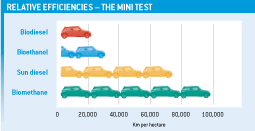Biogas – the future for UK farms?

The food-versus-fuel debate came under scrutiny when Tim Evans – a keen advocate of on-farm energy production – took to the stage at the recent NAAC Contractor 2007 conference.
He believes that the inevitable decline in fossil fuel availability and the concerns over energy security (90% of UK gas is imported) will see many types of renewable energy start to look a lot more viable. However he warned that farmers need to consider which areas of production they want to get involved with carefully.
“UK farmers have a great opportunity to make themselves independent suppliers of energy,” he pointed out.
“But we’ve got to be really careful not to fall back into the trap of becoming mere commodity producers, supplying a biofuel feedstock at whatever price the buyer offers.”
To do this Mr Evans argues that farms need to keep control over the whole energy chain, right through from growing the raw material to pumping electricity into the National Grid.
“We’re a long way behind the rest of Europe in the biofuels league and currently fall behind countries like Lativia and Slovenia,” he said.
“But by choosing the right form of production we can start to redress the balance.
“Forget biodiesel and bioethanol – their production can only work on a massive scale and most of the plants in the UK will be run on imported feedstock from places like Indonesia and Malaysia – hardly sustainable fuel.”

He puts forward a simple model as a measure of renewable fuel efficiency – the Mini Test, ie how far a Mini will travel on a hectare’s worth of fuel.
Biodiesel fares worst taking the little car just over 20,000km. Bioethanol manages just over 30,000km/ha.
Then there is a marked jump to synthetic ‘Sun-diesel’, produced from biomass and converted to liquid fuel, it carries the Mini over 70,000km.
But bio-methane from fermented crops, slurry or organic waste tops the chart at nearly 97,000km/ha.
And that’s where Mr Evans’ interests lie. His company – Renewable Zukunft (Rewable Future in German) – promotes the concept of on-farm biogas production.
He claims that by putting a 400ha (1000acre) arable unit down to crops to feed a farm-scale bio-gas plant in 2006, farmers could have generated nearly £10,000 additional net profit.
And that figure could look a whole lot more rosy if government support is increased to raise renewable electricity values from £65/mW to over £100/mW, as is expected by 2009.
“For an investment of at least £2m, a 1mW plant consuming 1000acres worth of grass, maize and wholecrop silage, topped up with slurry and manure can generate a 20% return on capital,” says Mr Evans.
“Plus you still get the nutritional benefit of the processed slurry as a fertiliser at the end. Why aren’t we all doing it?”

